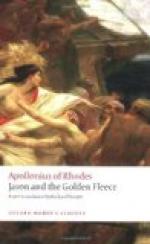BOOK I
Beginning with thee, O Phoebus, I will recount the famous deeds of men of old, who, at the behest of King Pelias, down through the mouth of Pontus and between the Cyanean rocks, sped well-benched Argo in quest of the golden fleece.
Such was the oracle that Pelias heard, that a hateful doom awaited him—to be slain at the prompting of the man whom he should see coming forth from the people with but one sandal. And no long time after, in accordance with that true report, Jason crossed the stream of wintry Anaurus on foot, and saved one sandal from the mire, but the other he left in the depths held back by the flood. And straightway he came to Pelias to share the banquet which the king was offering to his father Poseidon and the rest of the gods, though he paid no honour to Pelasgian Hera. Quickly the king saw him and pondered, and devised for him the toil of a troublous voyage, in order that on the sea or among strangers he might lose his home-return.
The ship, as former bards relate, Argus wrought by the guidance of Athena. But now I will tell the lineage and the names of the heroes, and of the long sea-paths and the deeds they wrought in their wanderings; may the Muses be the inspirers of my song!
First then let us name Orpheus whom once Calliope bare, it is said, wedded to Thracian Oeagrus, near the Pimpleian height. Men say that he by the music of his songs charmed the stubborn rocks upon the mountains and the course of rivers. And the wild oak-trees to this day, tokens of that magic strain, that grow at Zone on the Thracian shore, stand in ordered ranks close together, the same which under the charm of his lyre he led down from Pieria. Such then was Orpheus whom Aeson’s son welcomed to share his toils, in obedience to the behest of Cheiron, Orpheus ruler of Bistonian Pieria.
Straightway came Asterion, whom Cometes begat by the waters of eddying Apidanus; he dwelt at Peiresiae near the Phylleian mount, where mighty Apidanus and bright Enipeus join their streams, coming together from afar.
Next to them from Larisa came Polyphemus, son of Eilatus, who aforetime among the mighty Lapithae, when they were arming themselves against the Centaurs, fought in his younger days; now his limbs were grown heavy with age, but his martial spirit still remained, even as of old.
Nor was Iphiclus long left behind in Phylace, the uncle of Aeson’s son; for Aeson had wedded his sister Alcimede, daughter of Phylacus: his kinship with her bade him be numbered in the host.
Nor did Admetus, the lord of Pherae rich in sheep, stay behind beneath the peak of the Chalcodonian mount.
Nor at Alope stayed the sons of Hermes, rich in corn-land, well skilled in craftiness, Erytus and Echion, and with them on their departure their kinsman Aethalides went as the third; him near the streams of Amphrysus Eupolemeia bare, the daughter of Myrmidon, from Phthia; the two others were sprung from Antianeira, daughter of Menetes.




